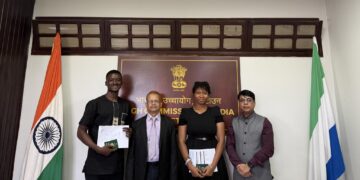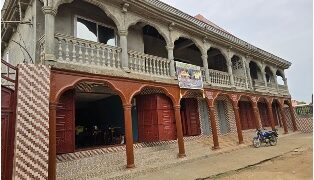By: Josephine Nyeweah in Kenema district
Stakeholders from Liberia, Guinea, and Sierra Leone, with support from the International Union for Conservation of Nature (UICN) through Mano River Union (MRU), as part of the Building River Dialogue and Governance (BRIDGE) project, have ended a three-day regional engagement on information and training session in Kenema city, Eastern Sierra Leone, on MOA-MAKONA and MANO transboundary committees on benefit sharing related to shared water courses, with a case study of the KENO DAM on the MAKONA river.

The engagement took place at the Kenema District Council Conference Hall along Nyandeyama Road in Kenema City, Eastern Sierra Leone.
The Deputy Chief Administrator, Kenema District Council, Mr. Patrick Jakema, described the engagement as a move in the right direction in maintaining peace at all times by equitably distributing the resources that are binding the three countries together.

He called on participants to always take a positive move in addressing issues bordering the three countries.He maintained that the Makona/Moa and Mano rivers are two transboundary river basins in the Mano River Union sub-region, shared between Guinea, Liberia, and Sierra Leone; these watersheds are key shared resources.
The overall objective of this training on Natural Based Solution (NBS) is to promote a common understanding of the opportunities and value of NBS in order to ensure that they are applied in water resource management.

Dr. Alkaly Kamara, Director of the National Hydraulic/Ministry of Energy of the Republic of Guinea, disclosed about the KENO DAM on the MAKONA river, adding 7 megawatts are being produced, 4 megawatts will be allocated for Guinea, and the remaining 3 megawatts will be distributed to neighboring countries (Liberia and Sierra Leones).
Also making remarks was Mr. Emmanuel Vaye, Assistant Minister for Planning of the Ministry of Mines and Energies of the Republic of Liberia. The Liberian Assistant Minister stressed the importance of water to the region and wished participants a fruitful deliberation.
The issue of Yenga was also a topical issue during the session. However, participants pointed out that the Yenga issue can be resolved diplomatically between the Member States, and that much cannot be said about it at the moment considering its sensitivity.

Mr. Anthony Kullie, Director of Hydrological Service of the Ministry of Mines and Energy of Liberia, assured his colleagues of Liberia’s continuous engagement with its neighbors in always maintaining peace and integration in the MRU sub-regional given that we are the same people.
Mr. Augustine Sannoh, head of the Civil Society Organizations Eastern Sierra Leone, expressed that there are several waters linking the three countries (Sierra Leone, Liberia, and Guinea) that have several resources that will be beneficial to the people of the region. He further stated that the goal of the civil society organizations is to ensure that the three countries benefit from the God-given natural resources equitably in the interest of the masses of the member countries.
The facilitator of the training, Mr. MEWOUTH THANG Armel Gilles of the IUCN/PACO, stressed the importance of a minimum of 30% of women’s participation in the project activities. He further stated that the BRIDGE project will focus on energy, Environment/Forestry, hydraulics, agriculture, and fishing, considering their adverse impacts on water quality.
For his part, the Project Coordinator at the Mano River Union, Mr. Abdoulaye Doumbia, extended the greetings of the MRU Secretary-General, Amb. Mr. Simeon M-B. Moribah, and expressed his gratitude to the people of Kenema for the warm reception accorded the participants. He admonished participants to utilize knowledge acquired during the training and train others.























